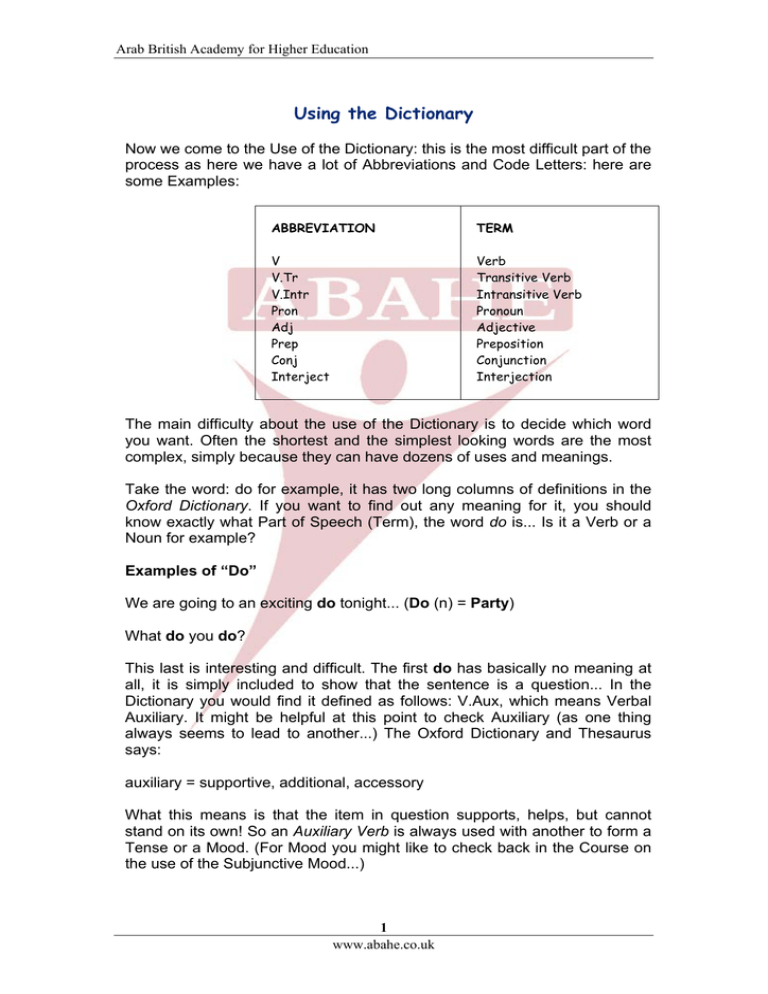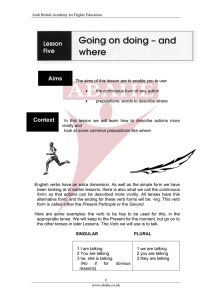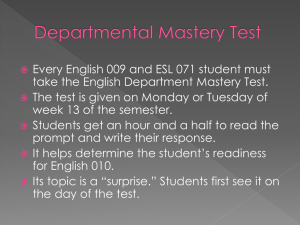
Arab British Academy for Higher Education
Using the Dictionary
Now we come to the Use of the Dictionary: this is the most difficult part of the
process as here we have a lot of Abbreviations and Code Letters: here are
some Examples:
ABBREVIATION
TERM
V
V.Tr
V.Intr
Pron
Adj
Prep
Conj
Interject
Verb
Transitive Verb
Intransitive Verb
Pronoun
Adjective
Preposition
Conjunction
Interjection
The main difficulty about the use of the Dictionary is to decide which word
you want. Often the shortest and the simplest looking words are the most
complex, simply because they can have dozens of uses and meanings.
Take the word: do for example, it has two long columns of definitions in the
Oxford Dictionary. If you want to find out any meaning for it, you should
know exactly what Part of Speech (Term), the word do is... Is it a Verb or a
Noun for example?
Examples of “Do”
We are going to an exciting do tonight... (Do (n) = Party)
What do you do?
This last is interesting and difficult. The first do has basically no meaning at
all, it is simply included to show that the sentence is a question... In the
Dictionary you would find it defined as follows: V.Aux, which means Verbal
Auxiliary. It might be helpful at this point to check Auxiliary (as one thing
always seems to lead to another...) The Oxford Dictionary and Thesaurus
says:
auxiliary = supportive, additional, accessory
What this means is that the item in question supports, helps, but cannot
stand on its own! So an Auxiliary Verb is always used with another to form a
Tense or a Mood. (For Mood you might like to check back in the Course on
the use of the Subjunctive Mood...)
1
www.abahe.co.uk
Arab British Academy for Higher Education
So do this tiny but most annoying word has a great many meanings, and
therefore definitions; let me list you a few, after we have dealt with the
sentence below:
What do you do?
We have looked at do an auxiliary verb denoting a question; the second do
is more straightforward, and is simply from the verb do (V.Tr = Transitive
Verb) describing the action of doing: = perform, carry out, achieve...
To do - or not to do - that is the question!!
(With apologies to W. Shakespeare)
Various meanings of “do”:
a)
(n) party, celebration
b)
(v.tr) perform, carry out
c)
(v.intr) i) to have to do with = be connected with;
ii) act, behave
d)
(v.aux) i) Question: do you know?
ii) Negative: I do not know
When looking something up, you must be clear what you are looking for. Of
course this is far easier said than done, but one way of doing it is to check
very carefully the context (the surrounding background) of the word you wish
to check.
Looking up any word in the dictionary is rather like solving a puzzle, or
reading through a detective story and trying to solve the mystery! There will
always be clues to guide and help you, but at all costs you must avoid the
manifold red herrings (many distractions!) whose only purpose is like the
original red herring to put you off the scent!
Finally the conclusion you come to will be your own affair, no one can solve
any mystery except yourself. But once you have developed your confidence,
to come to this solution will be far easier than you might ever have thought
possible. And the ensuing satisfaction will more than make up for the work
involved in achieving it!
The next Activity, just coming, will be some practice of the Pointers outlined
here. Good luck; and you always have the Key at the end...
Activity 2
Read through the following Passage and look up and give definitions of
the words in bold:
2
www.abahe.co.uk
Arab British Academy for Higher Education
The Bible has everything. Those who composed that amalgam of pure
genius need to be thanked - whoever they are. But like Shakespeare,
Homer, and our good old friend Anon, we will never know exactly who
were responsible for that compilation of human experience.
Why do I refer to the Bible here? Apart from bringing in everything
else of man’s good and ill, starting in the New Testament with the
birth of a rejected Child, and ending with His death by a particularly
unpleasant process that we are told took at least three hours, there
is a wonderful episode in Acts 2 (not Act II) that reads as follows.
“When the day of the Pentecost came, all the believers were
gathered together in one place. Suddenly there was a noise from the
sky, which sounded like a strong wind blowing, and it filled the whole
house where they were sitting. Then they saw what looked like
tongues of fire which spread out and touched every person there.
They were all filled with the Holy Spirit and began to talk in other
languages, as the Spirit enable them to speak.”
The Bible is a miracle. It is no wonder that on Desert Island Discs,
Roy Plomley, Michael Parkinson, Sue Lawley, (does it matter who in
truth?) always include the Bible as one of the essential books to take
to your Desert Island.
I would accept Shakespeare as Number Two, but with all the respect
due to Desert Island Discs, the Bible should always be presented as
Number One, and rightly so.
And from the time the Bible was compiled, languages and the interrelationship of peoples have always been of fascination to mankind. As
it is so today, for why else should large language companies present
full page advertisements of the languages they can teach, if they did
not feel they had a ready market for their products? The “Gift of
Tongues” is still considered a true gift indeed!
325 Words)
All Rights Reserved © Arab British Academy for Higher Education
3
www.abahe.co.uk









